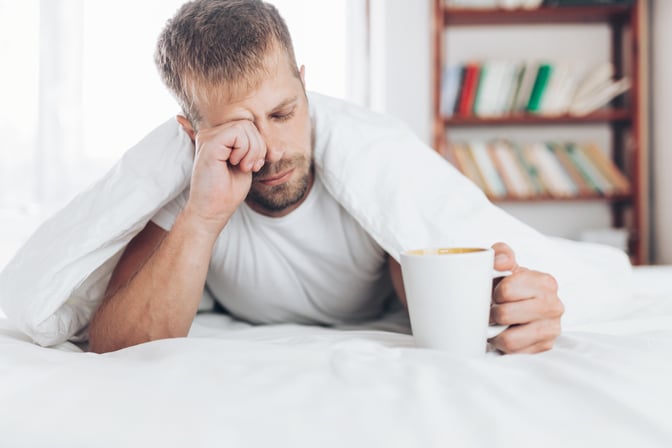
Benign Prostatic Hyperplasia or BPH is one of the most common ailments faced by men as they age.
In fact, 50% of all men between 50-60 years of age, 75% of men in their seventh decade of life, and 90% of men over 80 will be affected to some extent by changes in their prostate. While not a malignant progress (not cancer), BPH is characterized by increased growth of the prostate gland due to proliferation of the cells of this organ. As the prostate enlarges it compresses the urethra impeding the flow of urine out of the bladder during urination. This leads to the common lower urinary tract symptoms (LUTS) that bring men with BPH to the doctor.
Interestingly, while the symptoms of BPH can be very disturbing for men, the enlargement of the prostate may not represent a diseased state. In fact, the prostate goes through two cycles of growth, the first at puberty and the second beginning around the age of 25. This second cycle of growth continues for the rest of a man’s life and while some men do not experience symptoms due to this growth cycle, those with BPH can attribute their discomfort to this normal growth cycle.
Symptoms of BPH
When the prostate becomes enlarged, it may constrict the urethra, blocking the outflow of urine from the bladder. This often leads to the need to urinate more frequently with less urine passing out of the body each time you go to the restroom.
The majority of men with BPH complain of some combination of the following symptoms:
- Feeling like the bladder is full even after urinating
- Urgency to urinate
- Decreased or weak urine stream
- The urine stream starting and stopping when using the bathroom
- Difficulty starting urination
- Dribbling of urine after completing urination
- Pushing or straining during urination
- Nocturia or the need to urinate multiple times at night
- Inability to urinate at all (If you experience this symptom, it may be a medical emergency and you should seek medical attention immediately)
Causes of BPH
As mentioned earlier, the enlargement of the prostate may be part of the normal aging process of the male. The exact cause of the growth of the prostate and why it causes urinary symptoms in some men but not others is poorly understood. Hormone balance is believed to play a role in BPH, but the exact mechanism is unclear.
Testosterone
It is known that testosterone plays a role in prostate enlargement as the absence of testosterone prevents prostate enlargement. Yet, removal of testosterone after onset of BPH does not resolve the symptoms.
DHT
Another potential hormonal regulator of BPH is dihydrotestosterone (DHT). DHT is created from testosterone by the enzyme 5-alpha reductase, and pharmacologic inhibition of this enzyme has been shown to improve BPH symptoms. Yet, it is unclear just how DHT causes BPH as the receptors for DHT on the prostate decrease with age.
Estrogen
Estrogen is a likely culprit in the development of BPH. As a male ages, testosterone decreases and estrogen increases. Studies have shown that the aging prostate is less sensitive to DHT and more sensitive to estrogen. Estrogens increase androgen (testosterone and DHT) receptor levels on the prostate.
SHBG
Sex hormone-binding globulin (SHBG) is being recognized as an important factor in age related changes to the prostate, including BPH. Normally, SHBG helps to deliver sex hormones to target organs, binding to receptors on the surface of cells and releasing hormones into the cell. In BPH, it appears that not only does SHBG act as a docking site for hormone delivery, but SHBG receptor binding stimulates prostate growth associated with BPH. Like estrogen, SHBG increases with age as testosterone decreases. Although it is clear that there is a relationship between sex hormones and BPH, the exact relationship between these hormones and BPH remains unclear.
Diagnosis of BPH
The diagnosis of BPH can be made clinically based on patient symptoms and a physical exam. Some the ways that a doctor may diagnose BPH include:
- International Prostate Symptom Score – This simple questionnaire identifies the severity if symptoms and while is not a true diagnostic for BPH, helps guide and monitor treatment over time.
- Prostate Exam – This exam, performed by a doctor with the patient bending over or side lying, involves the physical palpation of the prostate gland using a finger inserted into the rectum. Known as the Digital Rectal Exam (DRE), this quick exam (usually around 30 seconds) may allow the doctor to identify problems with the prostate and to help differentiate between BPH, prostatitis, and prostate cancer.
- PSA blood test – Prostate Specific Antigen (PSA) is a protein made exclusively by the prostate and when the prostate is healthy, very little PSA should be found in the blood. Elevations of PSA are not always found in BPH, but elevated levels or rapid rises in PSA levels can indicate disease of the prostate.
- Specialized Urological testing – When there is severe blockage of the bladder, you may be referred to a urologist to perform specialized tests that examine the health of the bladder and urethra and can guide the use of more invasive treatments to resolve the urinary issues.
Natural Treatment Options for BPH
There are many natural treatment options to relieve the symptoms of BPH. These options are generally believed to be safe, but it is important to discuss treatment with an experienced practitioner such as a Naturopathic Doctor or Integrative Medical Doctor who is an expert in the use of these herbs and nutrients.
- Saw Palmetto (Serenoa repens) may be the most widely known herb for the treatment of BPH. In a number of studies, it has been shown to be as effective as the standard of care pharmacologic medicine for men with mild to moderate symptoms of BPH. While Saw Palmetto does not shrink the prostate, it does interfere with the actions of hormones and growths factors on the prostate, including potentially preventing the production of dihydrotestosterone (DHT) by inhibiting 5-alpha reductase enzymes.
- Stinging Nettle Root (Urtica dioica) is an anti-inflammatory herb and the root portion seems to have an affinity for the prostate gland and the other organs of the urinary system. In herbal medicine, nettles root is used to improve the flow of urine, which would help relieve symptoms of BPH, especially when used in combination with other herbs.
- Pygeum (Prunus africanum) can dramatically reduce the LUTS associated with BPH especially when used in combination with Saw Palmetto and Stinging Nettles. While the exact mechanism by which this herb improves urinary symptoms is not known, it is considered to be a safe herb when used under the supervision of a qualified healthcare provider.
- Pumpkin Seed may have benefits for the health of the prostate due to their fatty acid content. While pumpkin seeds seem to have specific benefit for the prostate, it is possible that other sources of essential fatty acids, such as evening primrose oil, may have benefit as well, indicating that the anti-inflammatory and hormone modulatory effects of essential fatty acids may be the key in treatment.
- B-sitosterol is a phytosterol that has been shown to reduce symptoms of mild to moderate cases of BPH. In addition to helping with symptoms of BPH, B-sitosterol may help normalize cholesterol levels by blocking the absorption of some cholesterol in the gastrointestinal tract. Due to the effects in the GI tract, B-sitosterol can cause GI upset in some people and should be used under the direction of a qualified healthcare provider.
- Diindolylmethane (DIM) and Indole-3-carbinol (I3C) both help the body metabolize and eliminate estrogen. Enhanced elimination of estrogens can help to mitigate the effects of estradiol on the prostate in BPH.
- If symptoms are severe or if there is urinary retention, pharmacologic or surgical treatments may need to be considered (for more information on the pharmacologic and surgical interventions for BPH visit the Urology Care Foundation).
Additional Considerations for BPH
If you have leaky gut, you might also have a leaky urethra.
The prevalence of leaky gut has increased in the population due both to an increase in causative agents in lifestyles and in popular awareness. Gut permeability means that the inner most membrane of the GI tract, which is usually tightly formed and prevents anything from passing through it, begin to have leaks. This allows food particles and microbes to cross the gut barrier and interact with the immune system resident to the GI system and can cause many symptoms including inflammation and auto-immune processes.
Like the gut, the urethra has a membrane lining that must remain impermeable to prevent metabolic byproducts and urinary toxins from leaking into surrounding tissues. Due to the similarity of the GI and urethral lining, immune processes that cause leakiness of one membrane can similarly affect the other. When metabolic byproducts and urinary toxins leak into the prostate from the urethra, this can cause irritation and inflammation of the prostate, exacerbating prostate issues or leading to chronic prostatitis.
Improving lifestyle and diet can help to restore function to both the GI and urethral lining, decreasing leakiness and potentially improving symptoms of BPH. If you are experiencing digestive symptoms such as gas, bloating, diarrhea or constipation in addition to the urinary symptoms associated with BPH, a qualified healthcare provider like a Naturopathic Doctor or Functional Medicine Doctor can evaluate you for leaky membranes and help restore function to both your GI tract and the urinary tract to help improve your symptoms.
Randy Gastwirt, ND, PhD, is a Naturopathic Physician in Washington, D.C. He incorporates Naturopathic Medicine, Herbal Medicine, Physical Medicine, Biofeedback Therapy, Functional Medicine and Nutrition to bring balance to the body so that it can heal itself in the most effective way.
.png?width=305&height=132&name=NIHAlogoBLUE_3_transparent%20(2).png)


